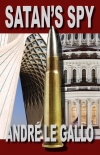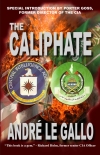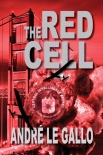Satan's Spy (The Steve Church saga Book 2) by André Gallo (dark academia books to read .TXT) 📗

- Author: André Gallo
Book online «Satan's Spy (The Steve Church saga Book 2) by André Gallo (dark academia books to read .TXT) 📗». Author André Gallo
Radu’s outburst turned heads in his direction. The waiter came and started to mop up the wine until the Maitre D’ arrived and led them to another table. He smiled reassuringly, “It is not a problem, Monsieur. These things happen. Enjoy the rest of your lunch. The waiter will bring your plates.” He went away rolling his eyes and smirking confidentially at the rest of the luncheon crowd.
Colchester said, “I’d offer to pay your cleaning bill but you wear a suit only once before you replace it, right? Where were we? Oh yes, for the sake of running some half-assed operation in order to be able to tell the Congress at budget time that the agency is a player. Plus,” he continued, “In the middle of a presidential election in Iran, the price for getting caught is going to be even higher.” Colchester shook his head. Then, he added, “Although I guess I should assume that your agency is sponsoring one or more of the candidates?” He looked at Radu with questioning eyebrows.
Radu nodded, “That’s a ‘Don’t Ask, Don’t Tell’ issue—above my pay grade. But back to the reporting the value of the operation. What we’re getting now—by the way, are you reading our stuff? ‘From a knowledgeable source with frequent high level contacts?’ What we’re getting now is good, really significant information on Iranian nuclear capabilities.”
Radu was referring to the Syrian officer he claimed to have recruited who had excellent contacts with Iranian intelligence. The agent was still meeting with the CIA’s Damascus station. Radu knew that Thérèse had her doubts about the credibility of the Syrian’s reporting and he resented it big time.
She had told him that the information seemed slanted in favor of Iran. “What are the chances that your guy is feeding us information that’s been prepared and precooked in Tehran?” she had asked. The final straw was when she had insisted on an addition to the source byline for every report from this agent, “This source could be providing the information to influence as much as to inform,” a cautionary formula usually reserved to information reports from foreign intelligence services.
Radu hoped she fell on her face over the handling of this new agent XYSENTINEL. Her departure would create headroom for his career advancement; with the Middle East always on the front burner, he thought he had a good chance to move up and replace her. He couldn’t figure out how Thérèse, as chief of the Africa Division, where nothing that happened was of any interest to the White House, had been promoted right past him. She had been lucky that Africa was a rich hunting ground and that both she and her officers had bagged several agents from hard target countries. Those agents had returned to their home ministries in Beijing, Moscow, and Havana to become reporting assets. Obviously, they were low-level. Otherwise, he knew that they wouldn’t have been assigned to Africa in the first place.
He also knew that Thérèse was recently divorced with two small children. Why wasn’t she home raising her kids? The corridor rumor at the time was that her husband had been taken hostage while on a business trip to Colombia and killed in crossfire during a rescue attempt by the Colombian army.
Radu’s mind returned to the present when Colchester, fingering his bow tie, said, “Well, I think I can outplay your boss. She can’t interfere with policy matters.”
As they parted, Radu smiled conspiratorially and said, “Khoda Hafez,” to flaunt his Farsi.
Before Colchester reached his car, he was on his cell phone. The automated reply identified itself as the “Washington Tribune.” He punched in the 115 extension and left a message, “Hi, David. This is Edward. You want to talk to me tonight?”
13. Shemīrān, Iran
Hashem Yazdi got into his car taking stock of the darkened street in this northernmost section of Tehran. He was a ranking member of al Quds, and he knew that if he didn’t have Ali Mousavi’s full trust he would already be dead. During his recruitment and preparation by Marshall and other CIA officers in a McLean, Virginia safe house, they had reviewed the operational security situation in Tehran and taught him standard precautions. However, as a senior officer of one of the world’s most powerful secret organizations, he felt above the CIA’s condescending caution. Nevertheless, a bit of paranoia was never a bad thing, and he self-consciously glanced at cars and pedestrians passing by his apartment building.
From the time he left for Dulles Airport to the time he landed in Tehran, his conflicting emotions had kept him on a roller coaster. He was relieved that he was allowed to leave the United States, apprehensive at the Faustian deal he had struck with the CIA, and was experiencing a sort of buyer’s remorse.
He was acutely conscious that his son and family were in the control of American authorities. He could help them in their American lives, or if he failed to carry out his part of the deal, the Americans would probably revoke their visas and ship them back to Iran. While his resettlement in the United States, financed with a substantial sum of money already earning interest, was also in the bargain, it was not of immediate relevance. He knew whether he ever returned to the United States was problematic, a situation he accepted fatalistically. Whatever Allah willed would take place. He felt confident he could take care of himself. Having gone to the United States could prove to have been an immense mistake or a wonderful opportunity.
As he analyzed the pros and cons of his situation, his biggest risk, the biggest unknown, was the professionalism or





Comments (0)